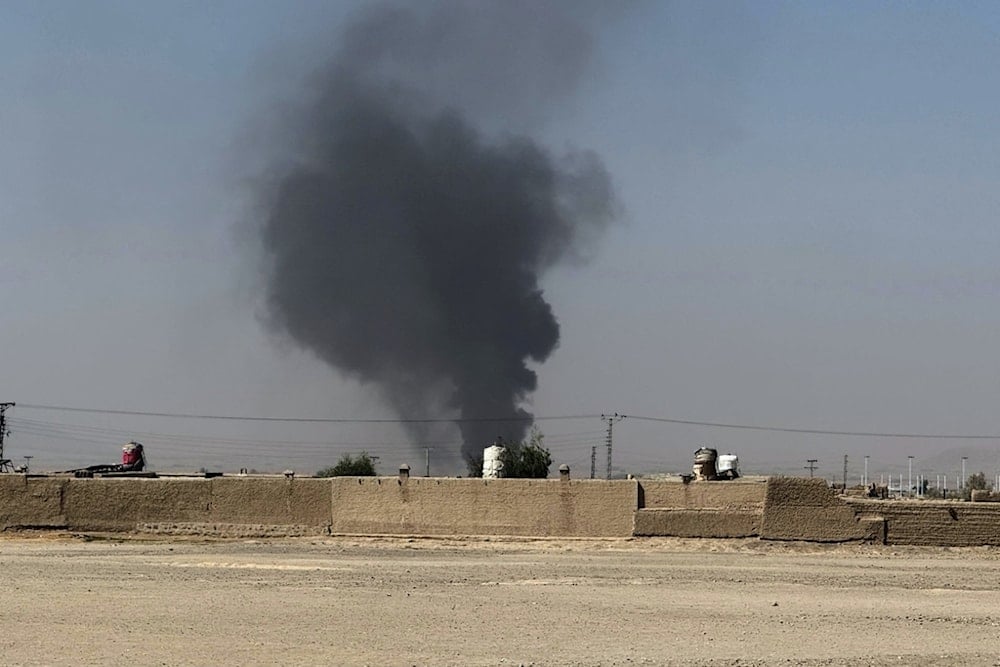Deadly Afghanistan-Pakistan border clashes claim over a dozen lives
Deadly border clashes between Afghanistan and Pakistan erupted along the disputed Durand Line, after Pakistan accused the Taliban of harboring Tehreek-e-Taliban Pakistan militants.
-

Smoke goes up after a shell exploded in a border area during clashes between Pakistan and Afghan forces, as seen from the Pakistan side of the border near Chaman, Pakistan, Wednesday, Oct. 15, 2025. (AP)
A fragile calm between Afghanistan and Pakistan collapsed on Wednesday as intense clashes broke out along their disputed frontier, killing more than a dozen Afghan civilians and injuring scores more, according to Taliban officials.
The renewed hostilities mark one of the bloodiest confrontations between the two neighbors since the Taliban's takeover of Kabul in 2021 and threaten to upend an already volatile regional balance.
A border long in dispute
The fighting erupted along the Durand Line, a 2,600-kilometer border drawn during British colonial rule that Afghanistan has never formally recognized. The demarcation cuts through Pashtun tribal lands, creating a constant source of friction. Clashes frequently erupt when either side accuses the other of building military posts or crossing into contested territory.
Taliban spokesman Zabihullah Mujahid said Pakistani troops launched early morning assaults that "martyred more than 12 civilians and wounded over 100 others." He claimed Taliban fighters "killed a large number of Pakistani soldiers," seized "posts and centres," captured "weapons and tanks," and "destroyed" most of Pakistan's nearby military facilities.
Islamabad issued its own version of events, blaming the Taliban for starting the battle. "Taliban forces attacked Pakistani post near Chaman (district)," said Habib Ullah Bangulzai, a local administrator on the Pakistani side.
He said four civilians were injured and that Pakistani troops had "repulsed" the attack after five hours of heavy exchanges.
Roots of escalation
The violence follows weeks of mounting accusations from Islamabad that Tehreek-e-Taliban Pakistan (TTP) militants, responsible for a surge in deadly attacks inside Pakistan, are operating from safe havens across the Afghan border. The Taliban administration has repeatedly denied those claims, insisting that "no Pakistani militants are present in Afghanistan."
Analysts, however, note that elements of the TTP have historical and ideological ties to the Afghan Taliban, and many fighters are believed to move freely across the porous frontier. Pakistan's military has responded with cross-border shelling and occasional airstrikes in recent months, further inflaming tensions.
Wednesday's fighting, which began after smaller weekend skirmishes, brought both countries to a standstill. Border crossings, including at Chaman-Spin Boldak, a vital trade artery, were shut down, stranding hundreds of cargo trucks loaded with essential food and fuel supplies for landlocked Afghanistan.
Regional ripples
The escalation has sparked concern across the region. China called on both countries to ensure the safety of its citizens and infrastructure projects, Russia appealed for restraint, and US President Donald Trump jumped in to say he was prepared to "help end the conflict."
The renewed hostilities come at a diplomatically sensitive time. As the clashes erupted, Afghan Foreign Minister Amir Khan Muttaqi was in India, Pakistan's main regional rival, to discuss restoring bilateral ties. New Delhi announced plans to reopen its embassy in Kabul, while the Taliban said it would send envoys to India, a move viewed by analysts as a potential shift in Afghanistan's regional orientation.
Read more: Timeline of India-Pakistan conflicts: 1947 partition - 2025's Pahalgam
Fragile future
Once close partners, Pakistan was among the few nations to support the Taliban's rise in the 1990s; the two governments now find themselves at odds over security, border control, and competing alliances.
The recent bloodshed underscores how historical grievances, contested borders, and suspicions of militant sheltering are eroding what little trust remains.

 4 Min Read
4 Min Read








